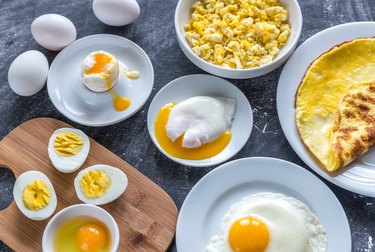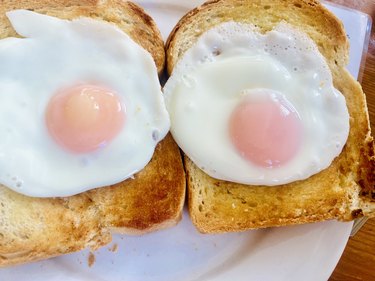
Lecithin is a nonessential fat (or phospholipid) that's found naturally in foods, such as eggs. It's sometimes added to processed foods to improve their taste and texture.
In the body, lecithin helps move fats and eventually, it turns into choline, according to the University of Rochester Medical Center. While lecithin itself is not an "essential" nutrient (meaning your body can make it on its own), choline is an essential nutrient that must come from food.
Video of the Day
Video of the Day
One of the most important roles of choline is making the neurotransmitter acetylcholine, which is directly related to memory, mood, muscle control and other brain and nervous system functions, according to the National Institutes of Health (NIH).
But before you reach for a supplement, try eating more of the foods high in lecithin listed below to get more of the nutrient.
How Much Lecithin Do You Need?
There is no recommended daily allowance for lecithin, and the amount you need can vary greatly, per the University of Rochester Medical Center.
However, there is a recommendation for an adequate intake of choline, which is between 425 and 550 milligrams per day for adults, per the Harvard T.H Chan School of Public Health. (Foods high in choline include beef, chicken, eggs, soybeans and cod.)
Talk to your doctor if you're curious about how adding lecithin to your diet might benefit you.
1. Egg Yolks

Eggs are an excellent source of lecithin, but you'll only find this fat in the yolks — not the whites. If you typically eat egg whites to cut down on fat and calories, you're not only missing out on lecithin, but also choline, selenium, several B vitamins and vitamins A, D and E.
One egg yolk has 25 percent of your daily value (DV) of choline. Most Americans do not meet the recommended intake for choline, according to the Harvard T.H Chan School of Public Health.
Eat a varied diet and you should get enough choline to meet your needs, but vegetarians who do not eat eggs or milk might fall short, per the Linus Pauling Institute.
Lecithin vs. Lectin
The two may sound the same, but they're different nutrients with vastly different roles in the body.
While lecithin is a fat, lectin is a type of protein found in many foods, including beans, nuts and grains. Raw beans and raw whole grains have the most lectin.
2. Soybeans
Lecithin is found naturally in soybeans, and it's extracted and used as a food emulsifier, which improves texture.
Soy is one of the nine major food allergens, but soy lecithin may be tolerated by people with a soy allergy. Soy allergens are found in soybean protein, which is mostly removed during the processing of soy lecithin, according to the University of Nebraska Lincoln Food Allergy Research and Resource Program.
Of course, if you do have a soy allergy, you should talk to your doctor before eating foods with soy lecithin added.
3. Milk
Milk and other dairy products like yogurt, cheese and butter are natural sources of lecithin. They are often also high in saturated fat and have smaller amounts of unsaturated fats.
While dairy foods are great sources of protein and calcium, you may want to choose low-fat milk, yogurt and cheese if you eat them often. Only 5 to 6 percent of your daily calories should come from saturated fat (around 13 grams) to keep your heart disease risk low, per the American Heart Association.
4. Wheat Germ
Wheat germ is the nutrient-rich part of a cereal grain responsible for the growth and development of new plant sprouts, per the Mayo Clinic. While you naturally eat wheat germ when enjoying whole-wheat products like bread and cereals, you can also find it on its own as a specialty health food.
Wheat germ is a lecithin-rich food, and it also gives you some fiber, protein and iron, per the USDA. Sprinkle it on top of oatmeal, cereal, yogurt or granola, or add it to baked goods for more nutrients.
5. Sunflower Seeds
Nuts and seeds are a good source of heart-healthy unsaturated fats, including the phospholipid lecithin. The oil in sunflower seeds is an excellent source of lecithin and is often extracted to be used in lecithin supplements.
Snacking on sunflower seeds will give you lecithin as well as folate, magnesium and vitamin E, per the USDA.
6. Chicken Liver
Chicken liver and other organ meats like kidneys and hearts are good food sources of lecithin.
While not as common as muscle meat like chicken breast or thighs, chicken liver is also an excellent source of iron — a 3-ounce serving offers 35 percent of your daily value, according to the USDA.
Lecithin Supplements
Lecithin is found in many common foods, but it's also available as a dietary supplement. You can find lecithin in various forms, including granules, capsules and oil at your local health food store or online.
Talk to your doctor before taking a lecithin supplement (or any supplement) to make sure it's safe for you based on your health status and any medications you're taking.
What Are the Benefits of Lecithin?
There are many claims lecithin can be used as a treatment for Alzheimer's disease, dementia, heart disease and gallbladder disease, but the evidence is not conclusive, according to the NIH.
There's slightly more support behind using lecithin during breastfeeding and to help prevent nonalcoholic fatty liver disease.
Some breastfeeding people use lecithin supplements to relieve clogged milk ducts, according to LactMed. While there's limited scientific evidence, many chestfeeding people have anecdotally found relief after taking it.
If you're having trouble with clogged milk ducts, talk to your ob-gyn or lactation consultant before taking lecithin supplements.
As a source of choline, lecithin has been tied to protection from nonalcoholic fatty liver disease, according to an April 2023 review in Antioxidants.
Choline, especially in the form of phosphatidylcholine or lecithin, may help remove fat from your liver and prevent buildup.
- NIH: "Choline"
- University of Rochester Medical Center: "Lecithin"
- Canadian Breastfeeding Foundation: "Lecithin"
- Advances in Nutrition:"Choline, Its Potential Role in Nonalcoholic Fatty Liver Disease, and the Case for Human and Bacterial Genes1,2"
- USDA: "Egg Yolks"
- University of Nebraska-Lincoln Food Allergy Research and Resource Program: "Soy Lecithin"
- Mayo Clinic: "The Good Germ"
- USDA: "Wheat Germ"
- American Heart Association: "Saturated Fat"
- USDA: "Sunflower Seeds"
- NIH: "Vitamin E"
- USDA: "Egg"
- Nutrients: "Egg Phospholipids and Cardiovascular Health"
- Harvard T.H. Chan School of Public Health: "Choline"
- Linus Pauling Institute: "Choline"
- Antioxidants: "The Effect of Bioactive Aliment Compounds and Micronutrients on Non-Alcoholic Fatty Liver Disease"
- LactMed: "Lecithin"